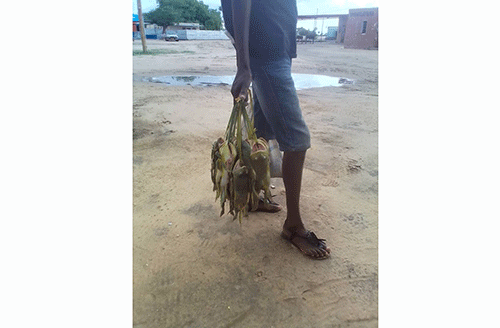ONGWEDIVA – The heavy rains experienced over the last few weeks as well as flash floods presented an abundance of frogs, fish and the indigenous leafy vegetable, ombidi, in the northern regions.
At the moment, frog season is in full swing and residents are enjoying the amphibians that are considered a seasonal delicacy by many.
Many people are catching catfish and frogs in the shallow waters.
Young women and men are also cashing in by selling the frogs along the roads, especially along the main road between Othingo and Oniimwandi in the Oshana region.
A bundle of four mature frogs goes for N$30.
Sindano Shivute told New Era that the rain has brought much happiness because he and his fellow villagers can plough their mahangu fields and eat spinach, fish and frogs, which they catch or harvest themselves, instead of spending money to buy such food.
Sirka Timoteus from Oshakati said it is time when villagers don’t worry too much about what to eat for dinner.
“Although frogs are considered traditional food by most of the northern people, there are people who refuse to even touch, let alone taste a frog, mostly due to its dreadful appearance. But for me, I will take revenge if you eat them alone,” she said with a chuckle.
Timoteus joked, “If you let me cook these frogs, putting in all necessary ingredients, most men who taste it will not be eating dinner at their homes,’’ she laughed.
She told New Era that pans in Othingo and Oniimwandi villages are full of people catching frogs, some with the intention to sell.
Tandeus Nangolo, who was also selling frogs, indicated that he makes up to N$350 or more on a good day selling frogs.
“I walked away with N$300 yesterday. The price was so good and the demand was very high. At the end of the day, nothing was left for my own consumption. But today, I caught enough frogs for selling and some more for my own consumption,” he added.
Another woman who was catching frogs said she prefers cooking the frogs the traditional way, outside, using firewood instead of a gas stove.
“Frogs have to be well-cooked. If not, you will regret eating them,” she smiled.
Explaining how to cook the delicacy, she said you first remove the intestines and put the frogs in a pot before adding water and salt.
“We all cook them in different ways; as long as you have enough ingredients to add to the taste! Delicious,” she beamed.
She said frogs spend the dry season buried deep under the soil, waiting for the rainy season, when they would re-emerge to feed and mate.
“We wait until we hear them croaking. That’s how we know they are ready to be caught,” she added.
– vkaapanda@nepc.com.na


